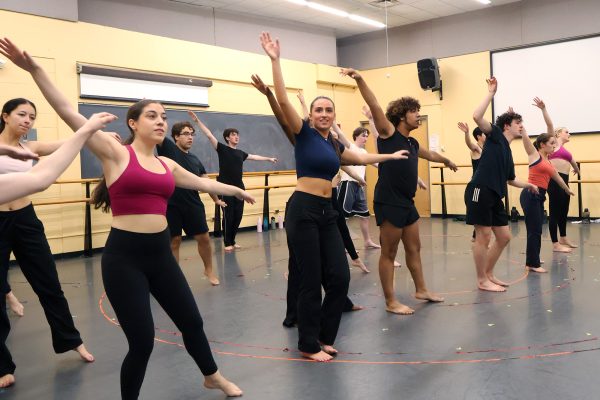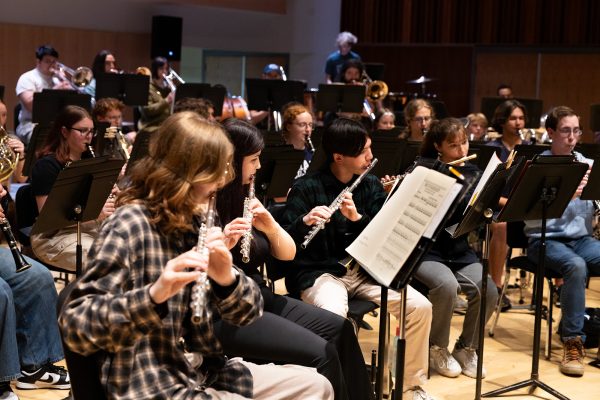
Kaeleigh Banda and Kaiden Chandler
On Aug. 31, the college announced the return of three Master's in Music programs in composition, conducting and performance, in addition to a new Bachelor's of Fine Arts in Dance and Choreography for Musical Theatre for the 2026-27 academic year. (From left, first-year musical theatre majors Itsuko Scoville and Lillian Hochman).
Ithaca College is expanding its palette of creative arts offerings through new majors and returning graduate programs amid college-wide cuts and restructuring.
On Aug. 31, the college announced the return of three Master’s in Music programs in composition, conducting and performance, in addition to a new Bachelor of Fine Arts in dance and choreography for musical theatre for the 2026-27 academic year.
Before the COVID-19 pandemic, the college had master’s programs in performance, conducting, composition, Suzuki Pedagogy and music education. The master’s programs in the School of Music were suspended by the Academic Program Prioritization Implementation Committee in 2021.
Steve TenEyck, dean of the School of Music, Theatre, and Dance, said the graduate students will provide support for the music students and faculty through accompanying, conducting ensembles and teaching secondary instruments.
“The Masters of Music programs are integral to our ecosystem,” TenEyck said. “[Graduate students] help the undergraduate student population in looking up. … They really become part of the fabric of the operations of our entire curricular offerings.”
Tim Downs, senior vice president for finance and administration and chief financial officer of IC, confirmed via email that MTD was an area identified for growth given the strong program demand in the research conducted by Hanover Research and Huron Consulting Group. Despite being the second smallest of the five schools at IC, MTD welcomed 10 new faculty members in Fall 2025, while the other schools only had two to six new faculty members.
According to College Vine data from 2024, IC has a general acceptance rate of 69% while MTD has an acceptance rate of 20-30%. IC Admissions was not able to provide its statistics on acceptance rates by the time of publication.
MTD’s growth has also been seen through the addition of the new BFA program in dance and choreography for musical theatre. Daniel Gwirtzman, associate professor in the Department of Theatre and Dance Performance, said the dance faculty has been working on the new major for about six years because of the pandemic, planning and approval process, and this major will be the first of its kind. He said students in the new dance program will be provided opportunities to be associate choreographers, assistant choreographers, dance captains and leaders in the creative team for mainstage musicals.
“It is impressive and exciting that we’re growing,” Gwirtzman said. “[It’s] a counternarrative to most of what we’re hearing in higher [education]. … It shows that we’re leveraging a strength and that we understand that even in difficult financial times, people seek entertainment, and the cultural offerings of theater and dance are nonnegotiable.”

The college’s creative program expansion is also continuing beyond MTD. At the Sept. 8 Faculty Council meeting, Melanie Stein, provost and senior vice president for academic affairs, said the new schedule grid is allowing for more cross-school initiatives, such as the potential new creative industries major. The major is planned to combine assets from four of the five schools at IC: the School of Business; the School of Humanities and Sciences; the Roy H. Park School of Communications; and the School of Music, Theatre, and Dance.
In 2019, the college added a Master of Business Administration in entertainment and media management degree, which has similar goals to the creative industries major of combining business with creative arts. Michael Johnson-Cramer, dean of the School of Business, said the college’s goal is to have a creative industries major available within the next two years or so.
“A lot of schools that have this sort of major don’t have the robust art scene that we do, both on campus and within the Ithaca and Tompkins County community, Finger Lakes region,” Johnson-Cramer said. “It’s just such a rich ecosystem for the arts. … You can’t walk on this campus and not get excited about musical theater, excited about going to a recital pretty much every night, right?”
Johnson-Cramer said the deans of the four schools have been collaborating with each other and the faculty to plan out the major and create the coursework.
“I’ve now sat in on meetings with colleagues around this, where we just don’t stop laughing and imagining and thinking about what this could do for a student,” Johnson-Cramer said. “I think that it’s a really great environment and culture to bring this to pass.”
Stein said via email that as of Fall 2025, the major will almost entirely be made up of courses that already exist, so no new resources will be allocated to it.
“With any new program, we monitor as time goes on, and if enrollment warrants it, we shift resources where they are needed,” Stein said via email.
Gwirtzman said there is an expectation that by the third year of the program, the college will hire new dance faculty, but until then, faculty have to rearrange existing resources to accommodate the new major.
“The college green-lighted the degree with an understanding that, at least initially, we will not gain any new resources,” Gwirtzman said. “Space is definitely a challenge … but we’re hopeful that it will [change] in the future once we demonstrate the need with these students coming in.”
TenEyck said he expects the master’s programs to total about 14 new students, but that may shift if the demand increases. Applications for the graduate programs and the BFA program in dance and choreography for musical theatre for the 2026-27 academic year are open through Dec. 1.
Khyle Wooten, assistant professor in the Department of Music Performance, said he plans to engage the conducting graduate students with his choral ensembles to give them practice working with ensembles in addition to their graduate seminar research. Wooten said the return of the graduate programs will bring light to the powerful legacies contained in the decades of history of master’s degree programs.
“It’s going to take a village to really give the best of ourselves and what IC represents to this incoming class of graduate students,” Wooten said. “Because the resources haven’t flowed like they have before, we will have to get creative, we will have to write more grants, we will have to do more faculty think-tanking. … So it is really going to take all of us putting our heads and our hands and our resources together to make sure that we have a good lift off.”

Sophomore Kaitlyn Campbell, a music education and vocal performance double major, said that having graduate students in the music program is something she has been hoping for.
“The competition is going to be a lot harder, because we have people who are going to have a lot more knowledge all around, so that’s a little tough,” Campbell said. “But learning from someone who has such talents and such knowledge is also better. So I see it as more of a good thing than a bad [thing]. I think that it may be competition, but I think that competition is not always a bad thing.”
TenEyck said he admires that Stein and other college administrators found a way to offer new programs without spending a large amount of money.
“It’s not just about, let’s just cut, cut, cut,” TenEyck said. “It’s about ‘How do we use what we have in the most strategic way? Where can we invest? Where can we find efficiencies?’ There are things that make us great that I think that we’re investing in, which is awesome.”
Wooten said that while IC is not providing new resources for the program, the faculty will continue to create their own resources to be able to impact an entirely new generation of musicians.
“It’s not been lost on me that even a deficit doesn’t deter us from being our most creative selves,” Wooten said. “It really speaks to the resilience of our faculty and student community who have not stopped giving the very best of their teaching or their resources or their lives.”
While the new programs will not be sustainable without additional resources for long, Gwirtzman said the beginning stages of the programs have sparked excitement across the MTD community.
“We had a department-wide meeting … and the majority of questions that came from the students were about the dance degree,” Gwirtzman said. “There’s tremendous enthusiasm. … We know the legacy of excellence in the arts here at IC, so we’re just expanding our portfolio, but really building off of that history.”